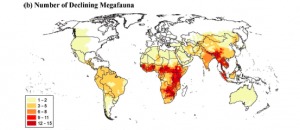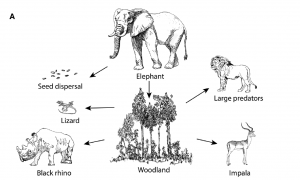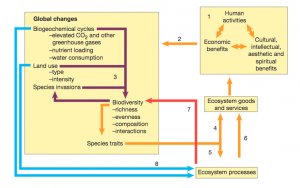In the light of the current epoch, the Anthropocene, being classified as a sixth mass extinction (Pievani, 2014), losses in biodiversity and its effects on ecosystems, from which humans directly benefit, has had a lot of scientific attention (Diaz et al., 2006). However, only recently has there been a focus on the global loss of terrestrial megafauna; larger bodied mammals of mass greater than 1000kgs (Ripple et al., 2015). In March 2014, the University of Oxford hosted the first ever international conference on ‘Megafauna and Ecosystem Functions’ (Malhi and Doughty, 2015) to address this global issue. Terrestrial megafauna, are under threat from human caused habitat loss and fragmentation (Segan et al., 2016), due to land-use change, such as agricultural expansion and deforestation (Ripple et al., 2015, 2016). Although this is a global issue, the heaviest decline in megafauna is concentrated in sub-saharan African and south-east Asia (Figure 1).

Figure 1– Global representation of the number of declining megafauna worldwide (Ripple et al., 2016)
Environmental change through the alteration of habitats puts the larger sized megafauna at a higher risk of extinction as they need larger, non-fragmented habitats, and have slower life-histories (Ripple et al., 2016), taking longer to reproduce.
Why focus on megafauna? Extensive research into losses of biodiversity and its effect on ecosystems has revealed one thing for certain: the importance of functional traits. Biodiversity can ensure the functioning of an ecosystem if its functional composition is adequate to maintain the system, having organisms with specific traits (Diaz, et al., 2006). Much like a well-working machine, all the pieces are needed for it to run. The more important parts of this machine, or ecosystem, are the megafauna, as many act as ecosystem engineers (Smith et al., 2015) and keystone species (Ripple et al, 2016). Megafauna fill the roles- niches- in the ecosystem that would otherwise not be filled. The effect of their loss will be felt by the whole ecosystem as impacts will filter down through trophic levels and the food web (Svenning et al., 2015).
The African elephant alters ecosystem structure and composition, through various behaviour including uprooting and debarking of trees (Mograbi et al., 2017), seed dispersal and alteration of habitats (Ripple et al, 2015). They have overall effects on the ecosystem in which they live, which indirectly affects the other organisms that depend on that ecosystem (Figure 2). Land-use change has caused a decline in African elephants (Ripple et al., 2015); a key player in ecosystem functioning. The ecosystem may therefore begin to fall apart without it’s key piece (Smith et al., 2015). This is just one example of how the loss of a single species can have significant implications, highlighting the severity of impacts if several species were to be lost.

Figure 2– Diagram demonstrating how the African elephant can effect the ecosystem and the other organisms they impact (Ripple, et al., 2015).

Figure 3 – Diagram and explanation of the interactions between global changes, human activities and ecosystems (Chapin III, et al., 2000).
These global changes can be felt not only by the animals, that depend on the megafauna, but by humans as well. Figure 3 shows how humans will also ultimately feel the effects of the global changes they cause due to their effects on ecosystems.
References:
Chapin III, F. S., Zavaleta, E. S., Eviner, V. T., Naylor, R. L., Vitousek, P. M., Reynolds, H. L., Hooper, D. U., Lavorel, S., Sala, O. E., Hobbie, S. E., Mack, M. C., Diaz, S., 2000. Consequesnce of changing biodiversity. Nature 405, pp 234-242.
Diaz, S., Fargione, J., Chapin III, F. S., Tilman, D., 2006. Biodiversity Loss Threatens Human Well-Being. PLoS Biol 4(8): e277
Malhi and Doughty, 2015. Megafauana and Ecosytem Function: Learning from the Giants. Available at < http://www.eci.ox.ac.uk/news/2015/1026-megafauna.html> [Accessed: 21st March 2017]
Morgabi, P., Asner, G. P., Witkowski, E. T. F., Erasmus, B. F. N., Wessels, K. J., Mathieu, R., Vaughn, N. R., 2017. Humans and elephants as treefall drivers in African savannas. Ecography 40: 001-011
Pievani, T., 2014. The sixth mass extincton: Anthropocene and the human impact on biodiversity. Rend. Fis. Acc. Lincei 25: 85-93
Ripple, W. J., Newsome, T. M., Wolf, C., Dirzo, R., Eceratt, K. T., Galetti, M., Hayward, M. W., Kerley, G.I.H., Levi T., Lindsey, P. A., Macdonald, D. W., Malhi, Y., Painter, L. E., Sandom, C. J., Terborgh, J & Van Valkenburgh, B, 2015. Collapse of the world’s largest herbivores. Science Advances, 1: e1400103, pp 1-12
Ripple, W. J., Chapron, G., López-Bao, J. V., Durant, S. M., Macdonald, D. W., Lindsey, P. A., Bennett, E. L., Beschta, R. L., Bruskotter, J. T., Campos-Arceiz, A., Corlett, R. T., Darimont, C. T., Dickman, A. J., Dirzo, R., Dublin, H. T., Estes, J. A., Everatt, K. T., Galetti, M., Goswami, V. R., Hayward, M. W., Hedges, S., Hoffmann, M., Hunter, L. T. B., Kerley, G. I. H., Letnic, M., Levi, T., Maisels, F., Morrison, J. C., Nelson, M. P., Newsome, T. M., Painter, L., Pringle, R. M., Sandom, C. J., Terborgh, J., Treves, A., Van Valkenburgh, B., Vucetich, J. A., Wirsing, A. J., Wallach, A. D., Wolf, C., Woodroffe, R., Young, H. and Zhang, L., 2016. Saving the World’s Terrestrial Megafauna. BioScience, 60 : 10, pp 807-812
Segan, D., B, Murray, K. A., Watson, J. E. M., 2016. A global assessment of current and future biodiversity vulnerability to habitat loss-climate change interactions. Global Ecology and Conservation 5, pp 12-21
Smith, F. A., Doughty, C. E., Malhi, Y., Svenning, J., Terborgh, J., 2015. Megafauna in the Earth System. Ecography 39: 2, pp 99-108
Svenning et al., 2015. Science for a wilder Anthropocene: Synthesis and future directions for trophic rewilding research. PNAS 114 (4), pp 898-906
[Word count: 485]
Recent Comments